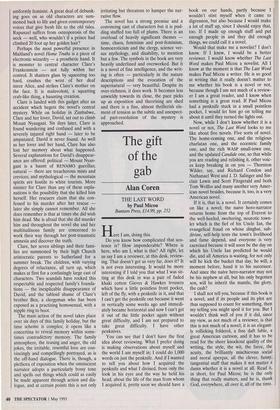The gift of the gab
Alan Coren
THE LAST WORD by Paul Micou Bantam Press, £14.99, pp. 252 Here I am, doing this.
Do you know how complicated that sen- tence is? How imponderable? Where is here, who am I, what is this? All right, let us say I am a reviewer, at this desk, review- ing. That doesn't get us very far, does it? It is not even interesting. It would be more interesting if I told you that what I was sit- ting at this desk in was a pair of faded khaki cotton Gieves & Hawkes trousers which have a little pointless front pocket, left of the fly, with a penknife in it, and that I can't get the penknife out because it went in vertically some weeks ago and immedi- ately became horizontal and now I can't get it out of the little pocket again without great difficulty, and I am not prepared to take great difficulty. I have other penknives.
You can see that I don't have the first idea about reviewing. What I prefer doing is making observations about myself and the world I am myself in; I could do 1,000 words on just the penknife. And if I wanted to tell you about how I acquired the penknife and what I divined, from only the look in his eyes and the way he held his head, about the life of the man from whom I acquired it, pretty soon we should have a book on our hands, partly because I wouldn't stint myself when it came to digression, but also because I would make a lot of stuff up, since I should enjoy that, too. If I made up enough stuff and put enough people in and they did enough things, we could call it a novel.
Would that make me a novelist? I don't know. If I knew, I would be a better reviewer. I would know whether The Last Word makes Paul Micou a novelist. All I know at the moment is that The Last Word makes Paul Micou a writer. He is so good at writing that it really doesn't matter to me whether his book is a novel or not, because though I am not much of a review- er I am a great reader, and I know when something is a great read. If Paul Micou had a penknife stuck in a small pointless pocket, I would let him go on telling me about it until they turned the lights out.
Now, while I don't know whether it is a novel or not, The Last Word looks to me like about five novels. Five sorts of novel. The home-coming one, and the religious charlatan one, and the eccentric family one, and the rich WASP small-town one, and the updated Candide one, so that while you are reading and relishing it, other voic- es keep breaking in on you — Thornton Wilder, say, and Richard Condon and Nathanael West and J. D. Salinger and Sin- clair Lewis and Scott Fitzgerald and both Tom Wolfes and many another very Amer- ican novel besides, because it, too, is a very American novel.
If it is, that is, a novel. It certainly comes on like a novel; the naive hero-narrator returns home from the top of Everest to the well-heeled, sweltering, neurotic town- let which is the fief of his Uncle Ian, the evangelical fraud on whose dingbat, sub- divine, self-help texts the town's livelihood and fame depend, and everyone is very exercised because it will soon be the day on which his Uncle Ian predicted he would die, and all America is waiting, for not only will he kick the bucket that day, he will, a moment before, hand it to his successor. And since the naive hero-narrator may not be his nephew at all, but his only begotten son, will he inherit the mantle, the glory, the cash?
I shall not tell you, because if this book is a novel, and if its people and its plot are thus supposed to count for something, then my telling you might spoil it for you. But I wouldn't think well of you if it did, since my view, as not much of a reviewer, is that this is not much of a novel; it is an elegant- ly rollicking folderol, a fine daft fable, a great American cartoon, and it has to be read for the sheer knockout quality of the writing, the style, the wit, the farce, the acuity, the brilliantly mischievous social and moral apergus, all the clever, funny, tangential stuff that makes it not matter a damn whether it is a novel at all. Read it, in short, for Paul Micou; he is the only thing that really matters, and he is, thank God, everywhere, all over it, all of the time.


























































 Previous page
Previous page